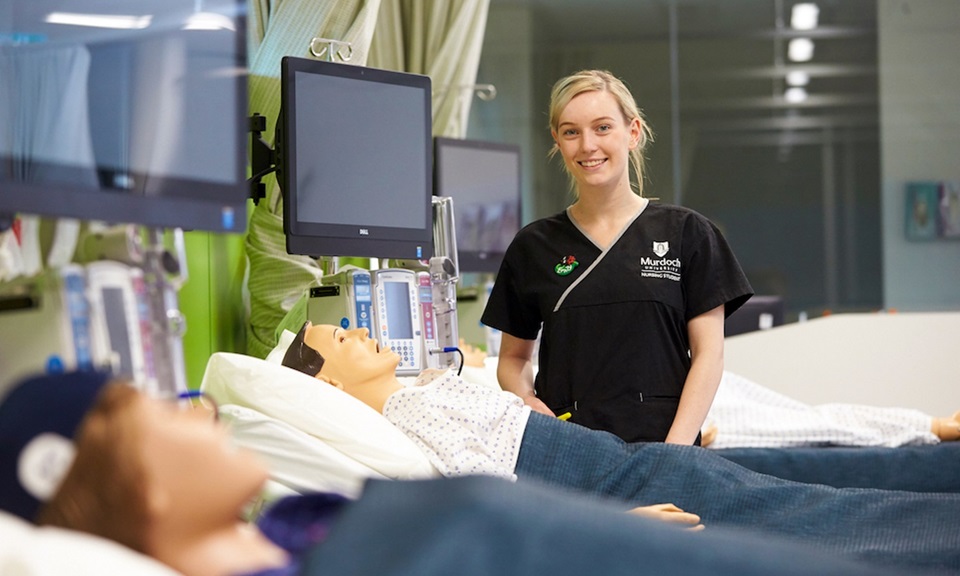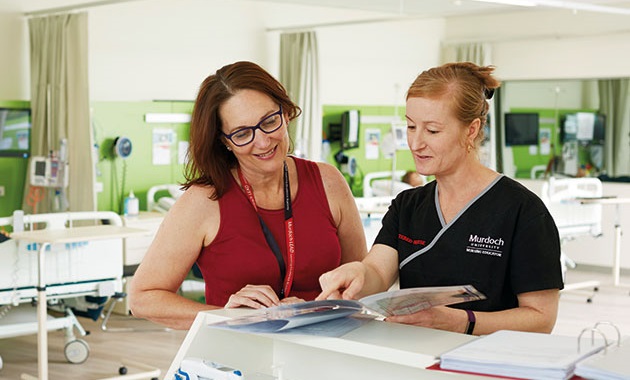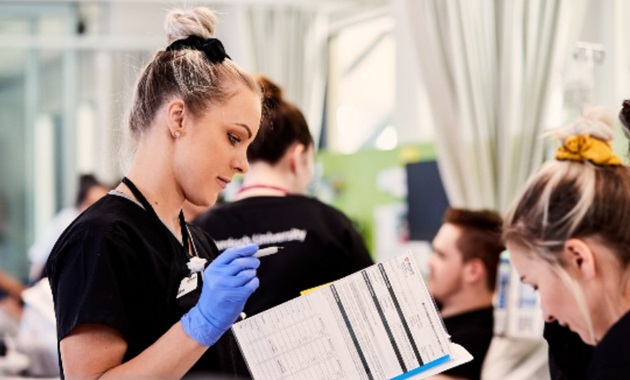Our graduates are welcomed by an industry looking for well-prepared nurses who have the knowledge and breadth of skills to provide nursing care across the broad spectrum of health and illness. Our three-year Bachelor of Nursing program provides an exceptional learning experience that blends nursing theory with clinical practice, so students graduate job-ready with the skills needed to make a difference in one of the most rewarding careers.
State-of-the-art learning facilities
We place a strong emphasis on working and learning in realistic environments to prepare students for the real world. Our contemporary clinical teaching wards and simulation suites provide students with real life experiences in inter-professional settings. Simulated learning is embedded throughout the Bachelor of Nursing Course, including high and low fidelity simulation, and role play using actors and avatars to enable students to develop their clinical skills in a safe supportive environment.
In our state-of-the-art learning facilities, we use high fidelity patient simulators (Laerdal SimMan®) and moulage (using make-up and tools to replicate wounds and injuries) techniques to create realistic scenarios for students. SimMan can simulate a wide range of medical conditions and patient responses, allowing nursing students to practice skills, develop their critical thinking and improve clinical judgement. We encourage students to work in teams during simulations to develop communication skills and improve collaboration, both of which are essential in the nursing profession.
Our simulation opportunities are specifically designed to prepare students for the wide range of clinical workplace experiences we offer, including settings that simulate hospital wards, emergency departments, operating theatres, community clinics, home settings and more. Our low fidelity task trainers provide students the opportunity to practice skills on infants right through to older adults, including medication administration, catheterisation, injections, wound care, intravenous therapies as well as more specialised skills such as nasogastric tube management, central line care, trauma and burns, tracheostomy care, recognition of deterioration and life support techniques.

Advancing Healthcare Leadership through Postgraduate Study
Health professionals’ effect societal and healthcare change through education and research, and Murdoch Nursing has the learning opportunities available to substantially develop student’s expertise and leadership skills to achieve these goals. Murdoch University School of Nursing has five courses on offer. All courses are available fully online so study can be undertaken from anywhere. Our courses have a strong focus on quality and safety in the healthcare environment, a skill set necessary to achieve facility accreditation in all areas of healthcare.
Undertaking post graduate study at Murdoch can set students up for careers in the following areas: Accreditation Coordinator, Quality and Risk Manager, HR Projects Director, Health Care Clinic Manager, Clinical Nurse Manager or Facility manager.
Testimonials from MHCM Alumni
“I found the MHCM to be an insightful and informative course, but for me the success of this program has to be attributed to the lecturers who were engaging and supportive throughout. There is no doubt that this course has improved my overall understanding and ability as a professional leader. If you have the chance…do it!” – Amanda Barnes RN Service Director/Centre Leader, GenesisCare
“At a minimum the MHCM course has gifted me the soft and hard skills required to lead and manage in my nursing management positions. Further to this, it has elevated my career options where I have been regularly offered and considered for promotional opportunities. Collaboration with other students and academic staff has continued to provide wonderful networking relationships” – Dalys Ullrich RN
“I use the information I have learnt almost daily. I already worked in a very holistic way, but this has heightened my confidence in myself and my knowledge. I have especially been using this information when discussing residential care transition as this is something I would shy away from previously…I have also been more comfortable having ‘difficult’ conversations when discussing client’s situation/health/outcomes etc. I always did this but would feel stressed.” - Amanda, Physiotherapist

